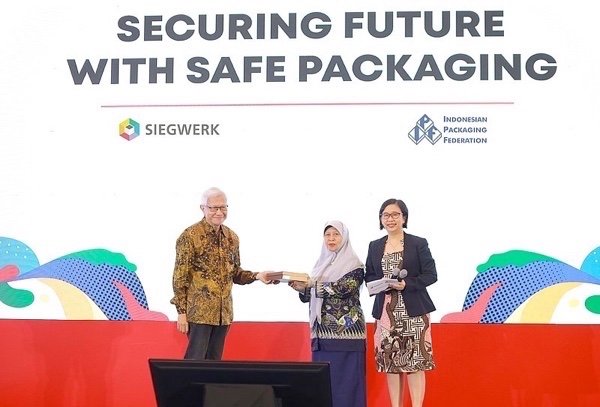Consumables
Siegwerk joins forces with IPF to raise safe packaging standards in Indonesia

Friday 15. December 2023 - The message was clear: In order to supply safe food packaging with appropriate inks containing safe solvents, pigments and other components, the need for a solid regulatory approach and compliance at all stages of the supply chain is imperative.
Siegwerk hosted a packaging ink seminar in Jakarta in cooperation with the Indonesian Packaging Federation (IPF) today. The aim of the event with the title “Securing Future with Safe Packaging” was to address food packaging safety issues and raise awareness among brand owners, regulators, converters, printers, and other key stakeholders on the importance of safe packaging.
During the seminar, Siegwerk not only highlighted the importance of safe food packaging especially for product and consumer safety but also emphasized the crucial role of printing inks and coatings in this context. The message was clear: In order to supply safe food packaging with appropriate inks containing safe solvents, pigments and other components, the need for a solid regulatory approach and compliance at all stages of the supply chain is imperative.
As Executive Director of IPF, Mr. Henky Wibawa held the keynote speech setting the frame for the seminar.
Other prominent participants were for example:
• Dra. Deksa Presiana, Apt., M. Kes, Head of team of Food Safety Standard – Indonesian FDA
• Dr. Ing-Herry Purnama, R&D Director, PT. Amcor Flexibles Indonesia
• Mr. Putut Pramono, Technical Advisor Packaging, PT Nestle Indonesia
Mr. Janarthanan Nallasura, Managing Director, South East Asia, Siegwerk emphasized the need for new and higher standards for food packaging due to high consumption of packaged food in Indonesia. “There is an urgent need to graduate from the obsolete and critical practices to advanced and safe modes of food packaging compliances,” he pointed out. “Ensuring packaging compliance is a complex challenge as it necessitates the stakeholders in the supply chain to collaborate and work together to deliver safe packaging for food products.”
Dr. Jörg-Peter Langhammer, Head of Global Product Safety and Responsibility at Siegwerk, further added that, “packaging safety still remains a highly important topic and no food is safe without proper packaging. However, ensuring packaging safety needs the entire supply chain to follow transparency and an integrated approach,” he elaborated. “The packaging value chain is complex and the responsibilities must be shared. That’s why enabling sustainable safe food packaging through toluene-free solvent based ink solutions and complying with strict global regulatory and product safety requirements is part of Siegwerk’s commitment.”
As globally operating ink manufacturer, Siegwerk knows what it takes to develop safe ink and coating solutions for all kinds of packaging applications. With its extensive commitment to product safety and responsibility, the company is making every effort to offer the safest inks and coatings worldwide. To date, Siegwerk has established itself as a global leader in safe packaging solutions and has already helped numerous brand owners with its expertise in terms of food safety and systematic processes to ensure regulatory compliance and avoid food contamination risks.
Based on its global network of experts exclusively dedicated to safety regarding both regulatory compliance and brand owner requirements, Siegwerk ensures that all inks and coatings are always suitable and safe for the intended end-use applications. In order to sustain this ambition, the company continuously adapts its product portfolio to the latest scientific findings, whilst embedding market trends and customer needs. Today, for example, Siegwerk not only exclusively offers toluene-free packaging inks, but also helps printers to switch to these safer solutions and thus to meet the increasing requirements of brand owners banning the usage of toluene in ink formulations intended for their food packaging material. It is undisputable that, toluene is associated with manifold adverse effects making it an issue related to product safety and responsibility as well as to occupational and environmental safety.
